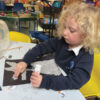
by Sarah Trybus
Focus Games
Emotions have a significant impact on our health and wellbeing. It is not always easy to express how we feel, and it is even harder to know how to deal with all these emotions. Developing emotional intelligence enables us to understand and manage our feelings effectively.
 Teaching emotional intelligence, at an early age, will help your children develop self-awareness and empathy. Research also shows that children who have higher emotional intelligence tend to pay more attention in class, be more engaged at school, develop healthy social skills, and have more positive relationships.
Teaching emotional intelligence, at an early age, will help your children develop self-awareness and empathy. Research also shows that children who have higher emotional intelligence tend to pay more attention in class, be more engaged at school, develop healthy social skills, and have more positive relationships.
Children do not always know how to express how they feel. They may be experiencing difficulties at school, anxiety, bullying, and cannot always say or show why they feel this way. Building emotional intelligence, and giving your children the tools to express how they feel, will make it easier for them to express themselves and find ways to help them manage the situation.
Emotions and feelings can be complex. According to the American psychologist, Robert Plutchick, there are seven basic emotions: anger, fear, joy, sadness, disgust, surprise, and confidence. The other emotions are more complex and come from two or more basic emotions.
However, when expressing our emotions, we tend to use limited vocabulary which might not express the complexity of the emotions we feel. Therefore, when teaching emotional intelligence to your children, it is very important to give them the framework, and the words to help them understand and express their feelings.
There are five key steps to help your children express their emotions:
1. Recognise and name the emotion
How are your children feeling? For example, have they become quieter and more withdrawn lately? Identifying these kinds of signs will help them recognise and name the emotion.
2. Understand and put the emotion into context
Once your children have recognised the emotion they are feeling, they need to understand why they felt this way. Did something specific happen that caused them to feel like this?
Understanding what caused the emotion also means that if a similar situation happens again you and your children will be more prepared to deal with it.
3. Express the emotion
Encourage your children to communicate their feelings using words, and not their hands. They can also draw or write down how they feel. There are plenty of ways your children can express their emotions in a calm and rational manner.
4. Normalise the emotion
Explain to your children that it is okay to feel various emotions, and that everyone experiences different feelings.
5. Find ways to manage the emotion
Help your children find techniques to manage their emotions and encourage positive behaviour. It may be a short-term technique to manage the emotion at the time, for example by taking deep breaths. It can also be longer term strategies that will help your children cope with their emotions over time. For example, routine exercise often helps reduce anxiety.
Parents and teachers can use fun and colourful resources to engage the children in this activity. The Canadian charity, Jasmin Roy Foundation, created The Emotion Game to help children develop their emotional intelligence, and build healthy social skills.
The game gives your children a framework that follows the five keys steps to emotional literacy. The pictorial cards provide children with information about the different emotions and how to recognise them. Once they have identified how they feel they place the ‘I’m feeling’ cards on a board to name the emotion. Children then explain why they feel this way. The Emotion Game also includes ‘I’d like’ cards that give different techniques, which children can use to manage their feelings in class and at home.
Going through the five steps of emotional literacy does not take long and can easily be integrated into a family routine or part of a lesson at school. Taking the time to discuss and learn about emotions will enable your children to develop their emotional intelligence, to be more engaged in class and to express positive behaviours.
To learn more about The Emotion Game you can visit: www.EmotionsGame.com Pictures courtesy of motherhoodtherealdeal.com











